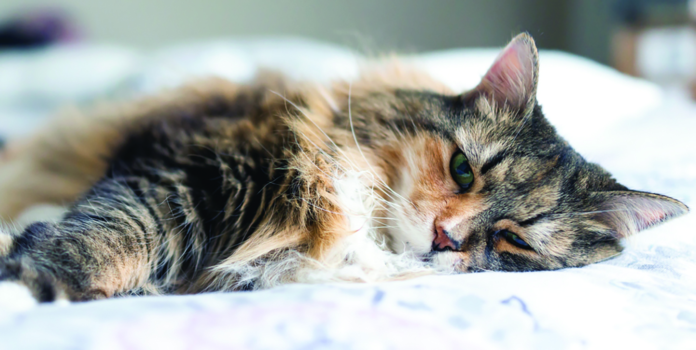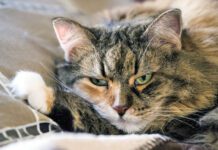Q. As I was reading a past issue of CatWatch with an article on chronic coughs, I noted that there was no mention of congestive heart failure (CHF) as a cause of cough in cats. I am a cardiac nurse, and I know the general public does not usually have stethoscopes, but that cough is distinctive! Please tell your readers about CHF as a cause of coughing in their cats.
A. Thanks for getting in touch. As you point out, cough is a sign of heart disease in people; it is in dogs, too. For reasons we don’t fully understand, though, cats with heart disease rarely cough.
Feline heart disease affects 15% of all cats. Most of these cats are affected by a form of heart muscle disease that causes the heart to thicken (called hypertrophic cardiomyopathy), in many cases leading to CHF.
The most common signs of CHF (in which blood “backs up” from a failing heart and accumulates in the lungs, causing fluid to leak into the lung tissue) in cats are rapid breathing, difficulty breathing, lethargy, sudden hind-limb paralysis (due to the development of a blood clot that blocks blood flow to the hind limbs), and collapsing.
Cats with CHF not only accumulate fluid within their lungs, but often accumulate fluid around their lungs, within their chest cavities (called pleural fluid). Pleural fluid can make it difficult for them to expand their lungs to take a breath, causing them to have to exert more effort to move air into and out of their lungs.
Pleural fluid can be removed by passing a fine needle through the chest wall and using suction to withdraw it (called thoracocentesis). Such removal often causes a rapid improvement in breathing.
It is rare for cats with either CHF or pleural effusion to cough, although they can experience significant and potentially life-threatening difficulty breathing. Difficulty breathing (called dyspnea) is an emergency in cats, requiring immediate veterinary attention.
The most common things that cause a cough in cats, as you have read in a previous issue, are feline asthma, bacterial or viral infections of the lungs (pneumonia), allergies, lungworm infection, and heartworm infection. In some cases, cats that are passing hairballs may produce a sound that can be mistaken for a cough. Sometimes, primary diseases of the lungs, such as cancer and some inflammatory diseases, can cause coughing in cats.
To my knowledge, we don’t really know why cats with heart disease rarely cough. Cats are unique in so many physical, biochemical, cognitive, and behavioral ways (as I am sure you know), and this is just another example of a feline difference that we can’t explain!
Perhaps future research will shed light on this issue, but until then we will have to accept, and be aware of, this important difference in how feline diseases present at home and in the clinic.




